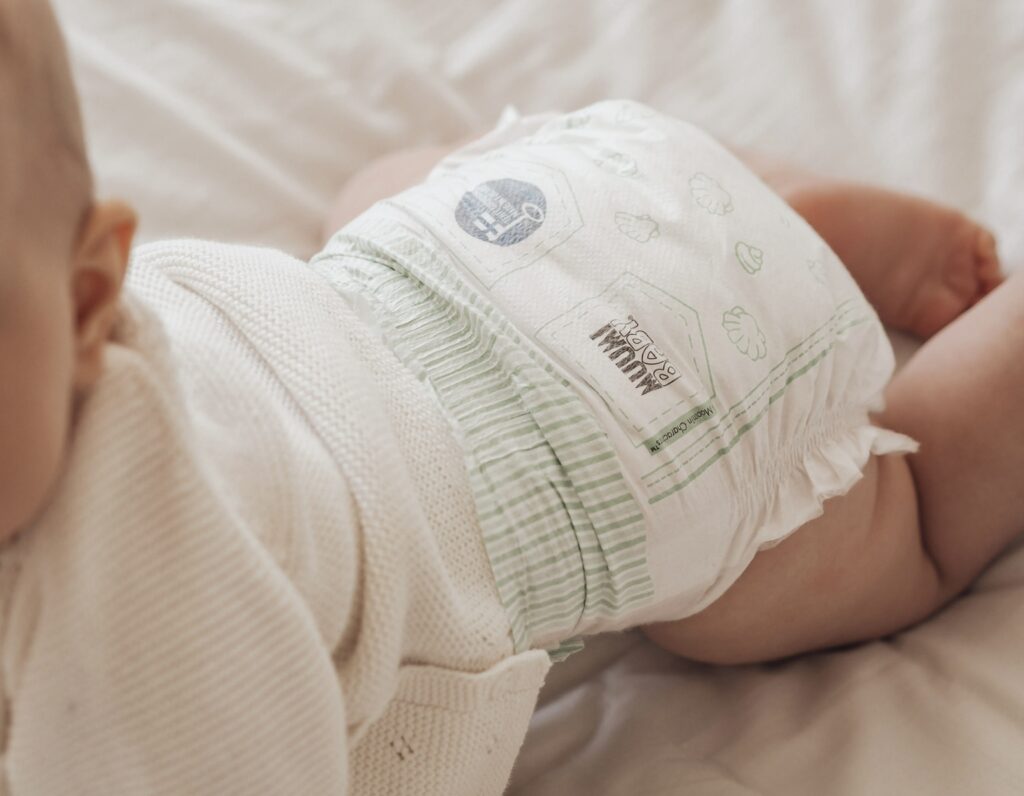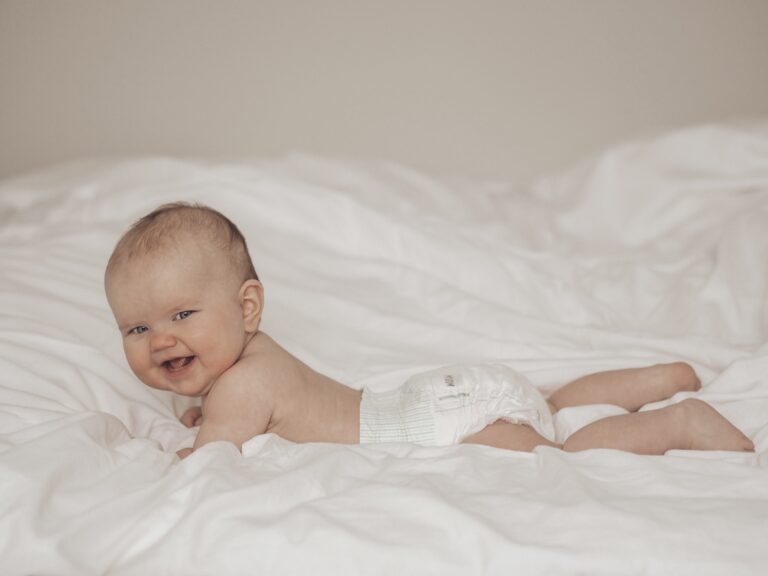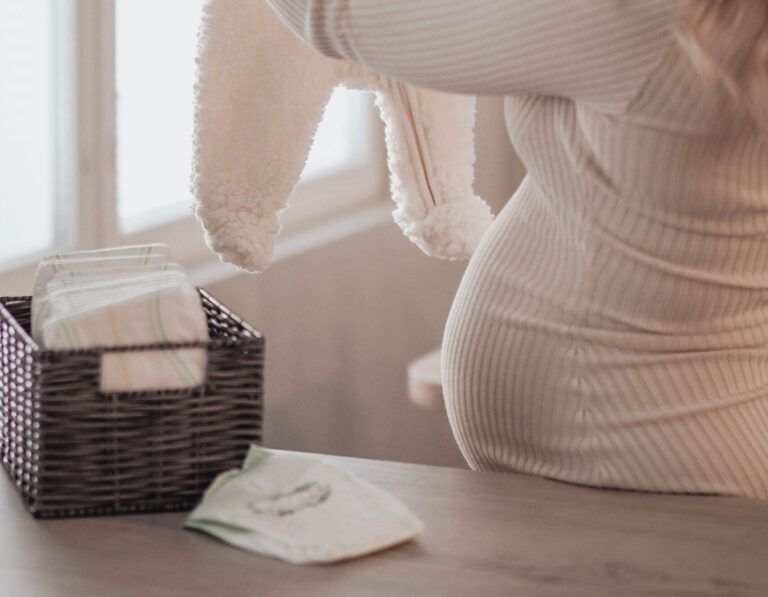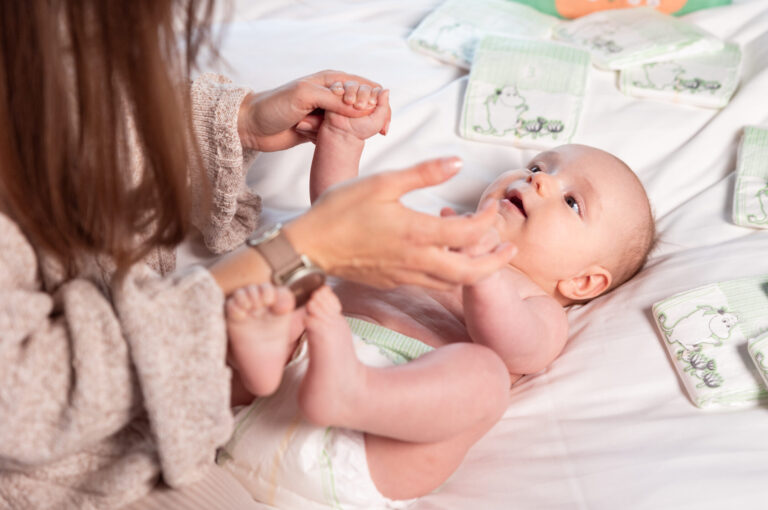Baby’s urination frequency can raise a lot of questions, especially for new parents. In this article, we look at how often a baby should usually pee and when to be concerned. We will also go through various factors that can affect the frequency of urination and help you understand your baby’s body functions better and notice possible health-related signs in time.
What to expect: Baby’s normal frequency of urination
A baby’s urination frequency can vary greatly depending on age and fluid intake. Immediately after birth, the baby may only pee a few times a day, but the number increases rapidly during the first weeks of life.
Usually, from about five days old onwards, the baby typically pees 6-8 times a day. When the baby is a few months old, it is normal for them to pee 6-10 times a day. However, it is important to understand that every baby is an individual and the “normal” amount can vary. Sometimes a baby may pee more often if they drink a lot of fluids or sweat a lot. Experts recommend that parents monitor their baby’s urination daily so that they can notice any changes and react to them in time if necessary.
Changes in baby’s urination frequency: When should you be worried?
It is completely normal for a baby’s urination frequency to vary from day to day. How do you know when a change in urination frequency should be taken seriously? Parents may be concerned if they notice sudden, unexplained changes in their baby’s urination frequency. One important sign to worry about is if your baby urinates less than six times a day, especially if they are more than five days old. Also, if the baby’s diaper is dry for several hours or if the urine looks very dark and strong, this may indicate insufficient fluid intake. A sudden increase in the frequency of urination can also be a sign of a possible infection. Remember that when you notice signs of such changes, it’s best to consult a healthcare professional to ensure your baby’s well-being.
How much is too much or too little? Health indicators of a baby
The baby’s health can be partly determined by the frequency of urination. In general, a newborn may only pee a few times a day, but this number increases rapidly during the first week. At about five days old, the baby should ideally pee about 6-8 times a day. If the baby urinates less often, it may be a sign of dehydration. Excessive urination, on the other hand, can indicate a disease such as diabetes. The color of the urine can also give an indication of the baby’s health. A bright yellow or even pale color is normal, but if the color turns dark, it may mean that the baby is not getting enough fluids.
It’s important to keep in mind that these are only general recommendations, and parents should contact a healthcare professional if they are concerned about their baby’s urination frequency or urine color. Every baby is unique, and “normal” can vary.
Here you will find general guidelines on how often your baby’s diaper should be changed!
Every baby is different and therefore the frequency of urination may vary.
Understand the relationship between urinary frequency and fluid intake
The amount of urine is directly related to the liquid intake of the baby. The relationship between food and hydration is an important factor in understanding a baby’s urination. Frequent urination is normal when the baby receives more liquid food such as breast milk or a similar diet. Breast milk is about 80% water, so breast-fed babies may urinate more than formula-fed babies. This is because formulas contain more protein and fat, which make the baby feel full for longer. Babies need a lot of fluids because they are small and their bodies contain more water than an adult. If the baby doesn’t get enough fluid, they may start to urinate less often. On the other hand, if the baby gets too much fluid, they may pee very often. Remember that every baby is different and therefore the frequency of urination may vary.
How can changing diapers help monitor baby’s urination frequency?
By observing and recording diaper changes, parents can monitor the baby’s urination and notice any changes. While it’s not necessary to count every pee, tracking how often your baby urinates is a useful way to make sure they’re getting enough fluids and peeing regularly.
Checking the condition of the diaper can also help detect if the baby is peeing too little or too much. For example, if your baby is peeing several times an hour or if the diaper is constantly wet, it could indicate excessive fluid intake or a disease such as diabetes. On the other hand, a dry diaper for a long time may indicate that the baby is drying out. Diaper changing can also help to notice the color of urine, which can give indications of possible diseases.
Here you can learn more about why diapers can leak, and find useful tips to help you prevent similar situations in the future.

Monitoring the baby’s urination frequency and its importance in assessing health
Monitoring the baby’s urination frequency is an essential part of assessing the baby’s health. The amount of urine directly reflects the amount of fluid entering the baby and the functioning of the body. This way, possible diseases can also be detected at an early stage. If the amount of urination decreases dramatically, it may be a sign of dehydration or kidney dysfunction. Excessive urination, on the other hand, can be a sign of, for example, diabetes or a urinary tract infection. So it’s important to keep track of how often your baby pees and what the urine looks like. This helps the doctor assess the baby’s health and understand what is happening in the body. A good practice can be, for example, recording the number of diaper changes in an application or memory so that the information is easily available when needed.
What to do if the baby pees more or less often than usual?
A change in the baby’s urination frequency can cause concern for parents and it can also be a sign of health problems. If you notice that your baby is peeing more often than usual, it could be a sign of a urinary tract infection, an overactive bladder or diabetes. On the other hand, if the baby’s urination frequency decreases significantly, it may be due to dehydration or kidney problems. In both cases, you should contact your healthcare professional to determine the reason for the change. Remember that although the frequency of urination can vary, significant changes or unusual behavior may be signs that your baby needs medical attention.
The baby’s urination frequency is an important indicator of their well-being.
Tips for managing and monitoring your baby’s urination frequency
The first step in monitoring your baby’s urination frequency is observation. Keep an eye on your baby’s urination, record when and how much they urinate. Use diapers that show when they are wet so you know when your baby last peed. Also note the color of the urine. Dehydration can cause darker urine, so clear or pale yellow urine usually indicates healthy fluid balance.If you notice significant changes or if you are concerned about your baby’s urination frequency, always contact your doctor or nurse. The baby’s urination frequency is an important indicator of their well-being, so be vigilant and take care of the baby’s adequate fluid intake.
You can also learn more about diaper changing routines and their benefits here!
Track your baby’s urination with Moomin Baby diapers
Using Moomin Baby diapers makes it easier to monitor the baby’s urination frequency. Moomin Baby diapers are made of high-quality materials that absorb moisture effectively, keeping the baby dry for longer. In addition, size 1-3 tape diapers have a moisture indicator that changes color due to moisture, so you easily know when it’s time to change the diaper. This will help you monitor your baby’s urination and notice any changes early.
Moomin Baby diapers are also dermatologically tested and made of breathable materials that reduce the risk of diaper rash and keep the baby’s skin healthy. So take advantage of these features to promote your baby’s well-being.
We welcome you to try Moomin Baby diapers by ordering a free Diaper hero sample here!










